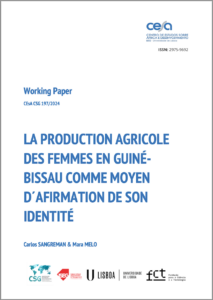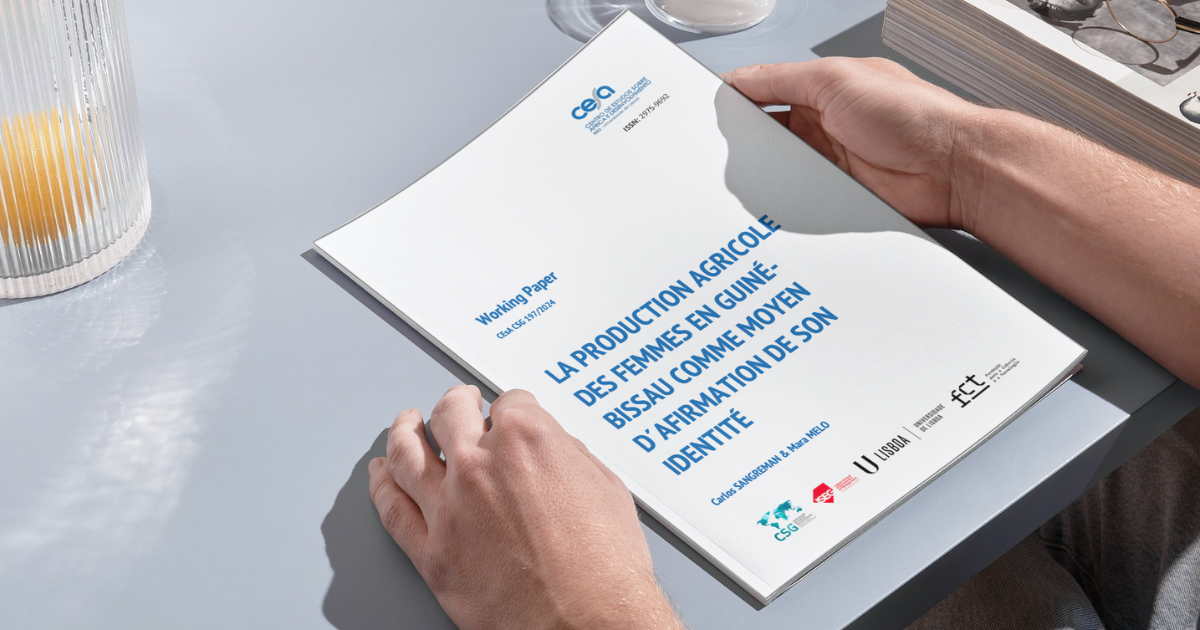Working Paper CEsA no. 197/2024 analyses the impact of work and income on the identity of women horticulturists in Guinea-Bissau
CEsA has published its firts Working Paper in 2024 (no 197/2024), entitled “La Production Agricole des Femmes en Guiné-Bissau comme Moyen d´Afirmation de son Identité”, in French, authored by Carlos Sangreman and Mara Melo. Sangreman is President of the CEsA Assembly, is a CESA researcher, assistant professor of the Universidade de Aveiro (Portugal), and consultant for Guinea-Bissau at the Institute of Hygiene and Tropical Medicine in Portugal and Casa dos Direitos in Bissau. Melo holds a master’s degree from the University of Coimbra and the Institut d’ Études Polítques de Bordeaux.
This Working Paper is an intermediate product of the study carried out for Swiss Cooperation in Guinea-Bissau. Surveys and interviews were carried out in the regions of Bissau, Biombo, Bafatá and Oio, in the areas of production of leguminous agricultural products, by producers (mostly women). The focus of the analysis is on the practice of horticulture with the income belonging to women: “it influences the economic factor through the production and sales activity, it influences cultural factors because it is the woman who makes the key decisions for the activity and not the man and fights against family discrimination because women take on responsibilities in the family and home that they otherwise would not be able to assume and, therefore, tend to have a greater voice in family decisions”.
Click here to access the Working Paper no 197/2024.
Abstract:
 This working paper is an intermediate product of the study done for Swiss Cooperation in Guinea-Bissau, written in French without any point in Portuguese. What we demonstrate, as well as the principles of restitution and appropriation by the persons or institutions that access to respond to surveys or interviews, are words that do not translate into concrete actions for this Cooperation. The data were obtained by surveys and interviews in the regions of Bissau, Biombo, Bafatá, and Oio, with the producers (which also include a limited number of male producers) of leguminous agricultural products, in a sample of 160 people chosen at random. At the option of the promoter, the study focused on the marketing of products and not on production. To better understand the results, it must be said that this business model is not very profitable, but it is an activity that gives a greater independence of women in relation to men in the family space, since decisions about the use of profits belong to the producers. It also has a potential environment of action for the affirmation of the social (and not just family) identity of women that should not be despised although, as far as we can see, this is expressed for now only in the organization of associations of producers.
This working paper is an intermediate product of the study done for Swiss Cooperation in Guinea-Bissau, written in French without any point in Portuguese. What we demonstrate, as well as the principles of restitution and appropriation by the persons or institutions that access to respond to surveys or interviews, are words that do not translate into concrete actions for this Cooperation. The data were obtained by surveys and interviews in the regions of Bissau, Biombo, Bafatá, and Oio, with the producers (which also include a limited number of male producers) of leguminous agricultural products, in a sample of 160 people chosen at random. At the option of the promoter, the study focused on the marketing of products and not on production. To better understand the results, it must be said that this business model is not very profitable, but it is an activity that gives a greater independence of women in relation to men in the family space, since decisions about the use of profits belong to the producers. It also has a potential environment of action for the affirmation of the social (and not just family) identity of women that should not be despised although, as far as we can see, this is expressed for now only in the organization of associations of producers.
Click here and get to know all the Working Paper Collection of CEsA
Author: CEsA Communications (comunicacao@cesa.iseg.ulisboa.pt)
Images: CEsA/Reproduction






